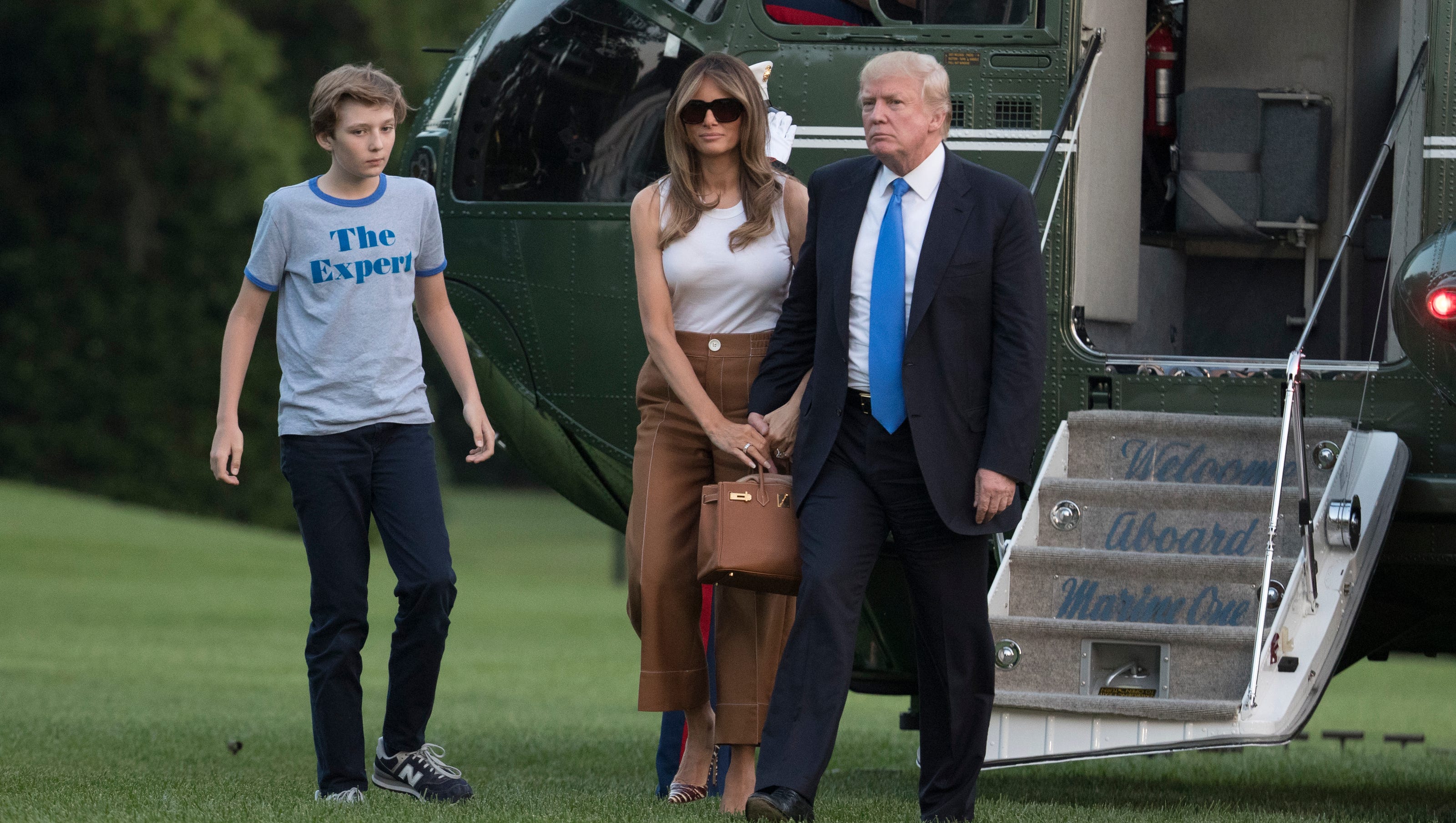Barron Trump, the youngest son of former U.S. President Donald Trump and First Lady Melania Trump, has been a subject of public fascination since his early years in the White House. While much of the attention has been focused on his family's high-profile political life, some discussions have emerged regarding Barron Trump's behavior and whether he might be autistic. These conversations have sparked curiosity among the public, but it's essential to approach such topics with sensitivity and respect for privacy. Speculation about anyone's health or neurodiversity without credible evidence can perpetuate misinformation and harm.
Barron Trump, born on March 20, 2006, spent a significant part of his childhood in the spotlight as the First Son of the United States. During his father's presidency from 2017 to 2021, Barron's reserved demeanor and limited public appearances led to various interpretations. Some media outlets and commentators speculated about his personality, while others wondered if his behavior might indicate autism. However, no official statements from the Trump family have confirmed or denied these claims, leaving the topic open to conjecture and debate.
Understanding the nuances of neurodiversity and respecting the privacy of individuals, especially minors, is crucial. While discussions around Barron Trump's potential autism may arise, it's important to focus on fostering a more inclusive and empathetic society. This article will delve into Barron's biography, personal details, and address common questions surrounding his life. By exploring these topics thoughtfully, we aim to provide clarity and promote meaningful conversations about neurodiversity and public figures.
Read also:Mike Tysons Family A Complete Guide To The Boxing Legends Personal Life
Table of Contents
- Barron Trump's Biography: A Glimpse into the Life of the Youngest Trump
- Personal Details and Bio Data of Barron Trump
- Is Barron Trump Autistic? Examining the Speculations
- What Is Autism, and How Does It Affect Individuals?
- How Does Public Perception Shape Discussions About Barron Trump?
- What Role Does Family Support Play in Nurturing Neurodiversity?
- Why Are Celebrity Children Often Subject to Speculation and Scrutiny?
- Conclusion: Fostering Empathy and Respect for All
Barron Trump's Biography: A Glimpse into the Life of the Youngest Trump
Barron Trump, the youngest child of Donald and Melania Trump, was born on March 20, 2006, in New York City. As the only child of the Trumps' marriage, Barron has always been a central figure in his family's life. His early years were relatively private, as his parents shielded him from the media spotlight. However, when Donald Trump was elected as the 45th President of the United States in 2016, Barron's life changed dramatically. At just 10 years old, he became the First Son, a role that brought him unprecedented attention.
During his father's presidency, Barron attended St. Andrew's Episcopal School in Potomac, Maryland, where he was known for his academic achievements and athletic interests. Despite his family's prominence, Barron maintained a low profile, rarely appearing in public or engaging with the media. His reserved nature often sparked curiosity, with some observers speculating about his personality and behavior. However, Barron's family has consistently prioritized his privacy, ensuring that he could grow up away from the constant glare of the public eye.
After leaving the White House in January 2021, Barron and his mother relocated to Florida, where he continues his education and enjoys a quieter lifestyle. While much of Barron's life remains private, his journey as the youngest Trump offers a unique perspective on balancing public life with personal growth. Below is a table summarizing his personal details and bio data:
| Full Name | Barron William Trump |
|---|---|
| Date of Birth | March 20, 2006 |
| Place of Birth | New York City, New York, USA |
| Parents | Donald Trump (Father), Melania Trump (Mother) |
| Education | St. Andrew's Episcopal School (Current) |
| Notable Traits | Reserved demeanor, athletic interests, academic achievements |
Is Barron Trump Autistic? Examining the Speculations
One of the most debated topics surrounding Barron Trump is whether he might be autistic. This speculation arose due to his reserved demeanor and limited public appearances during his father's presidency. However, it's important to note that no official statements from the Trump family or medical professionals have confirmed these claims. The lack of concrete information has led to widespread conjecture, often fueled by media interpretations and public curiosity.
Why Do People Speculate About Barron Trump's Autism?
Speculation about Barron Trump's potential autism stems from his behavior in public settings. Observers have noted his quiet and introspective nature, which contrasts with the extroverted personalities of his family members. Some have interpreted his reserved demeanor as a sign of autism, but such assumptions can be misleading. Autism is a spectrum disorder, and its characteristics vary widely among individuals. Without professional diagnosis or confirmation, it is inappropriate to label someone based on limited observations.
What Are the Risks of Speculating About Someone's Neurodiversity?
Speculating about Barron Trump's autism or any individual's neurodiversity can have significant consequences. First, it perpetuates stereotypes and misunderstandings about autism, reducing a complex condition to simplistic assumptions. Second, it invades the privacy of the individual and their family, subjecting them to unnecessary scrutiny. Finally, such speculation can create a harmful narrative that pressures families to address unfounded claims, diverting attention from more important discussions about acceptance and inclusion.
Read also:Understanding Alan Dershowitzs Hourly Rate A Deep Dive Into His Legal Expertise
Instead of focusing on unverified claims, society should prioritize fostering a culture of empathy and understanding. Recognizing the diversity of human behavior and respecting personal boundaries can help create a more inclusive environment for everyone, regardless of their neurodiversity.
What Is Autism, and How Does It Affect Individuals?
Autism, or Autism Spectrum Disorder (ASD), is a neurodevelopmental condition characterized by differences in communication, social interaction, and behavior. Individuals with autism often experience the world in unique ways, with varying strengths and challenges. Some may excel in specific areas, such as mathematics, music, or visual arts, while others may face difficulties with social cues or sensory sensitivities. The spectrum nature of autism means that no two individuals share the same experiences or traits.
How Does Autism Manifest in Children?
In children, autism can manifest in several ways, depending on where they fall on the spectrum. Some common signs include delayed speech development, repetitive behaviors, intense focus on specific interests, and challenges with social interactions. For example, a child with autism might prefer routine and become distressed when their environment changes unexpectedly. Others may avoid eye contact or struggle to interpret facial expressions and body language. It's important to note that these traits are not inherently negative; they simply reflect a different way of processing information and interacting with the world.
What Are the Strengths of Neurodiverse Individuals?
- Attention to Detail: Many individuals with autism exhibit an exceptional ability to focus on specific tasks or details.
- Creativity: Some neurodiverse individuals excel in creative fields, such as art, writing, or music.
- Loyalty and Honesty: People with autism often value honesty and loyalty in relationships.
How Does Public Perception Shape Discussions About Barron Trump?
Public perception plays a significant role in shaping discussions about Barron Trump, particularly regarding his behavior and potential neurodiversity. As the son of a former U.S. president, Barron has been under constant scrutiny, with every action or inaction analyzed and interpreted. This heightened attention has fueled speculation about his personality, including the unfounded claims about Barron Trump autistic traits. Such discussions highlight the challenges faced by public figures and their families in maintaining privacy while navigating societal expectations.
Why Is Public Perception Often Misleading?
Public perception is often influenced by media portrayals, which can oversimplify or exaggerate certain traits. In Barron's case, his reserved demeanor has been misinterpreted as a sign of autism, despite the lack of evidence. This misrepresentation underscores the importance of approaching such topics with caution and avoiding hasty conclusions. Public figures, especially children, deserve the same respect and privacy as anyone else, free from the pressures of public opinion.
What Role Does Family Support Play in Nurturing Neurodiversity?
Family support is crucial in nurturing neurodiversity and ensuring that individuals feel accepted and valued. For families like the Trumps, who are in the public eye, providing a supportive environment can be particularly challenging. However, prioritizing privacy and focusing on the child's well-being can make a significant difference. By shielding Barron from excessive media attention, the Trump family has demonstrated a commitment to protecting his personal growth and development.
Why Are Celebrity Children Often Subject to Speculation and Scrutiny?
Celebrity children, like Barron Trump, often face intense scrutiny due to their parents' fame. This attention can lead to speculation about their lives, including their health, behavior, and personality. While some curiosity is natural, it's essential to remember that these children are entitled to privacy and respect. The focus should be on celebrating their achievements and supporting their growth, rather than dissecting every aspect of their lives.
Conclusion: Fostering Empathy and Respect for All
In conclusion, discussions about Barron Trump and his potential autism highlight the need for empathy, respect, and understanding. While curiosity about public figures is natural, it's crucial to approach such topics with sensitivity and avoid making assumptions without evidence. By fostering a culture of inclusivity and acceptance, we can create a world where neurodiversity is celebrated, and everyone feels valued for who they are.
Frequently Asked Questions
1. Is Barron Trump Autistic?
There is no official confirmation or evidence to suggest that Barron Trump is autistic. Speculation about his neurodiversity is based on observations of his behavior, but without a professional diagnosis or statement from his family, such claims remain unfounded.
2. Why Is Barron Trump So Reserved in Public?
Barron Trump's reserved nature may simply reflect his personality or a preference for privacy. Many children, especially those in high-profile families, choose to maintain a low profile to protect their personal lives from public scrutiny.
3. How Can We Support Neurodiverse Individuals in Society?
Supporting neurodiverse individuals involves fostering an inclusive environment, promoting awareness and understanding, and respecting their unique strengths and challenges. Encouraging open conversations and reducing stigma can help create a more accepting society.
For more information about autism and neurodiversity, you can visit Autism Speaks, a leading organization dedicated to advocacy and research.

